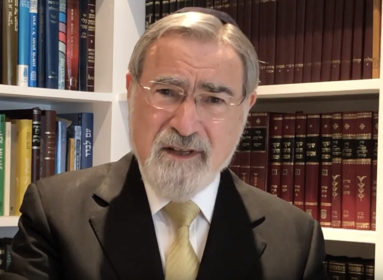
Renowned musician celebrated in West Hartford
By Cindy Mindell
WEST HARTFORD – An unfathomable amount of Jewish culture was lost during the Holocaust. But not all. Among those who survived the dark days of the Holocaust — the Shoah — and carried on Jewish artistic tradition is Flory Jagoda, known worldwide as the “Keeper of the Flame” of Sephardic music.
In 2015, the life of the renowned 93-year-old Sephardic composer and performer, interlaced with music from the September 2013 Celebration Concert performed in her honor at the U.S. Library of Congress, was chronicled in the documentary “Flory’s Flame.” The film will premiere in Connecticut on Saturday, Dec. 3 at the University of Hartford, accompanied by a concert of Sephardic music featuring Jagoda’s apprentice and accompanist, Hartford native Susan Feltman Gaeta. The evening is co-sponsored by the University of Hartford Greenberg Center for Judaic Studies and Congregation Beth Ahm in Windsor.
Born Flora Kabilio to a musical Bosnian Jewish family in 1923, “Flory” grew up in her birthplace of Sarajevo and in the town of Vlasenica. When the Nazis invaded Bosnia in April 1941, most of the Kabilio family was murdered, except for 17-year-old Flory, her parents, and one of her uncles. They escaped Bosnia separately before all reuniting in Italy, after Flory survived internment on the island of Korčula on the Dalmatian Coast. While in Italy, Flory met and married American GI Harry Jagoda and moved with him to northern Virginia in 1946.
Eventually, Jagoda dedicated her life to preserving her family’s cultural legacy through their Sephardic music in Ladino, the language of Jews from Spain and Portugal. But she came to it late, according to Gaeta.
“When her parents were able to come to the U.S. after the war, her mother refused to sing a note,” Gaeta says. “They were a very musical family but she was so devastated from the loss of her family that she couldn’t sing any of the music; she just didn’t want to talk about it.” It was only in her 40s, when her parents had died, that Flory began singing and writing music, sharing it with her two daughters, Betty and Lori.
Gaeta met Lori Jagoda Lowell in the early ‘90s, after spending eight years in Buenos Aires, where she studied voice and classical guitar and became fluent in Spanish.
“Lori told me that she didn’t even realize that her mother had this music,” Gaeta says. “Flory began to open this chest of incredible treasure and started singing and talking and telling the stories of her family, and she couldn’t stop.”
Gaeta, Lori Jagoda, and Betsy Cary would go on to create Colors of the Flame, a Sephardic trio that performed some of Flory’s repertoire. Gaeta became Flory’s apprentice in 2002, through the Virginia Foundation for the Humanities’ Apprenticeship Program.
Jagoda is likely one of the last surviving native Ladino-speakers composing and performing Sephardic music today. Over the past 50 years, Jagoda has recorded five CDs and earned a National Heritage Fellowship from the National Endowment for the Arts, the highest honor given by the U.S. to traditional artists. In 2013, she was honored in a celebration concert at the U.S. Library of Congress by 25 musicians who have worked with her, including Gaeta.
A Hartford native, Gaeta grew up in West Hartford, the daughter of Frances and Philip Feltman. (A decade ago, the Greenberg Center for Judaic Studies established the Philip D. Feltman Professorship in Modern Jewish History, an endowed chair to honor Feltman’s involvement and philanthropy in the Jewish community.)
Like Jagoda, she hails from a musical family: both maternal great-grandfathers were cantors, her paternal grandfather performed in a Hartford Yiddish theater and played clarinet in a klezmer band. Her mother sang in choir at Beth El Temple in West Hartford, where the family has been active since its founding. At age 10, Gaeta began playing guitar, learning mostly by ear, and was very involved in the choir and music programs as a student at Conard High School.
Gaeta has performed in Washington, D.C. at the Kennedy Center for the Performing Arts, the United States Holocaust Memorial Museum, and the Jewish Folk Arts Festival, and for numerous Jewish and interfaith communities across the country. A teacher at the Nysmith School in Herndon, Va., she now performs as a soloist and with Trio Sefardi, which recently released Kaminos (“Roads”), a CD featuring several of Jagoda’s compositions and Sephardic melodies from all over the world.
Since the 2015 release of “Flory’s Flame,” Gaeta has performed Jagoda’s music at several screenings around the country, at times accompanied by her mentor. While visiting family in West Hartford last year, she showed the film to her brother, Steven Feltman, a Beth Ahm board member, who arranged the Connecticut premiere with the Greenberg Center.
“Flory lost nearly her entire family, so all of her music is written about them,” Gaeta says. “These wonderful melodies are a real celebration that preserves the memory of family and continues the Bosnian Jewish story. It’s a really important story to tell and I’m happy that I can help do it through Flory’s music.”
“Flory’s Flame” and Sephardic music concert featuring musicians Susan Feltman Gaeta and Howard Bass of Trio Sefardi will premiere in Connecticut on Saturday, Dec. 3, 7 p.m., in the University of Hartford’s Wilde Auditorium, 200 Bloomfield Ave., West Hartford. Tickets: $20 includes dessert reception. For information: hartford.edu/tickets or (860) 768-4228.
CAP: Flory Jagoda, from the film “Flory’s Flame”









 Southern New England Jewish Ledger
Southern New England Jewish Ledger














